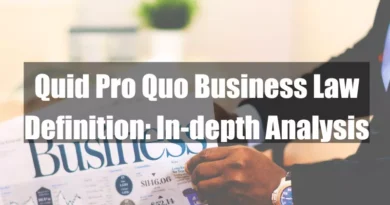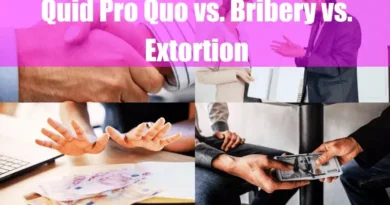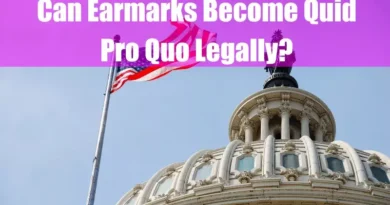What is the Definition of Quid Pro Quo in Politics?
In politics, quid pro quo is a Latin term meaning “something for something.” It refers to a mutual exchange in which one party provides something of value—such as money, services, or influence—in return for a favor or benefit from the other party. Quid pro quo is a common aspect of political negotiations and is not always illegal. However, when such exchanges cross ethical boundaries or lead to corrupt practices, they can undermine public trust in government institutions.
For example, a politician accepting a donation in exchange for promoting a favorable policy is a quid pro quo arrangement. While many political deals rely on mutual exchanges, they become problematic when they involve personal gain or corruption, eroding the integrity of public office.
Takeaways
| Key Points |
|---|
| Quid pro quo in politics refers to mutual exchanges where something of value is traded for a favor or benefit. While not always illegal, it becomes problematic when it involves personal gain or corruption, undermining public trust in government institutions. |
| U.S. laws, such as the Federal Election Campaign Act (FECA), the Hobbs Act, and federal bribery statutes, help regulate the boundaries of quid pro quo arrangements by distinguishing between legal political transactions and unlawful activities like bribery or extortion. |
| Transparency in campaign finance and lobbying is crucial to maintaining public trust. Clear disclosure of donations and lobbying activities helps to differentiate between lawful exchanges and corrupt practices. |
| Quid pro quo arrangements sometimes blur ethical lines, especially when they serve personal or political gain. Controversies like the Trump-Ukraine case highlight the potential for these exchanges to erode democratic principles and public confidence in governance. |
Origins of the Term
The phrase quid pro quo originated in 16th-century medicine, where it referred to substituting one remedy for another. Over time, its use expanded into business, law, and politics, describing any exchange of goods, services, or favors. It is widely debated in politics, specifically when the exchange involves unethical actions such as trading legislation for campaign donations or personal benefits.
Legal Quid Pro Quo vs. Corruption
Not all quid pro quo arrangements are illegal. In fact, many political negotiations, such as “logrolling,” where lawmakers agree to support each other’s bills, involve quid pro quo exchanges. However, when personal financial gain or other forms of corruption enter the equation, the situation can cross the line into illegality.
Corrupt quid pro quo arrangements often involve bribery or kickbacks. For instance, if a politician awards a government contract in exchange for a campaign contribution, that is a clear violation of ethical and legal standards. The Federal Election Campaign Act (FECA) and other laws attempt to limit such corruption by regulating donations and exchanges to prevent undue political influence.
U.S. Laws Governing Quid Pro Quo
Several U.S. laws, such as campaign finance regulations and anti-bribery statutes, address quid pro quo practices to combat corruption and enhance transparency in political dealings. These laws aim to distinguish between lawful political exchanges and illegal arrangements involving undue influence or favors. Understanding these laws helps distinguish between legitimate political negotiations and illegal activities.
Federal Election Campaign Act (FECA)
The Federal Election Campaign Act (FECA), enacted in 1971, regulates the role of money in U.S. federal elections by imposing limits on contributions and requiring public disclosure of campaign finances. FECA restricts how much individuals and groups can donate to federal candidates and mandates transparency by requiring the disclosure of donors’ names and the amounts they contribute.
The Act’s goal is to limit the potential for undue influence in politics while recognizing that not all contributions are corrupt. Contributions given in exchange for political favors, however, violate federal campaign finance laws and are illegal.
The Hobbs Act
This federal law criminalizes extortion, including extortion by public officials acting “under color of law.” It prohibits officials from using their position to obtain payments or property to which they are not entitled, especially when such payments are made in exchange for official actions.
Although the Hobbs Act does not explicitly define bribery in the same manner as other anti-bribery statutes, it addresses situations where officials use their authority to demand or receive something of value improperly.
Under the Act, politicians cannot legally solicit payments in return for official acts. Courts have consistently interpreted the law to cover instances where an official accepts payments for performing or refraining from a particular action in their official capacity. For example, threatening to withhold government action unless a contribution is made would qualify as illegal extortion, thus constituting a quid pro quo under this statute.
Bribery Statutes (18 U.S.C. § 201)
Federal law under 18 U.S.C. § 201 defines bribery involving federal officials, making it a criminal offense to offer or accept “anything of value” in exchange for influencing an official act. This statute aims to prevent the corrupt influence of public officials in the performance of their duties. Under 18 U.S.C. § 201(b), the law applies both to those offering the bribe and to the public officials who accept it.
While campaign contributions are generally legal, they can cross the line into bribery if there is a clear “quid pro quo” arrangement—meaning that the donation is explicitly tied to the promise of favorable legislative action. In such cases, federal bribery laws, including 18 U.S.C. § 201, could be invoked.
However, the complexities of campaign finance laws mean that not all donations that coincide with favorable actions by a politician meet the legal threshold for bribery. Direct evidence of corrupt intent is necessary to pursue a bribery prosecution in such contexts.
Honest Services Fraud (18 U.S.C. § 1346)
This statute defines a federal crime involving the deprivation of the “intangible right of honest services” through schemes that involve bribery or kickbacks. While it often targets public officials, it also applies to corporate officers and private individuals with fiduciary duties. The statute’s reach includes instances where individuals use their position to defraud others by accepting bribes or kickbacks in quid pro quo arrangements, particularly for personal enrichment.
Foreign Corrupt Practices Act (FCPA)
The FCPA, enacted in 1977, prohibits U.S. companies, individuals, and certain foreign entities acting within the U.S. from making payments to foreign officials to obtain or retain business. It primarily targets international business corruption, focusing on eliminating bribery in foreign markets.
While the Act underscores anti-bribery principles, its main focus is on international dealings, not domestic government quid pro quo bribery. Domestically, other U.S. anti-corruption laws are more specifically designed to address such practices.
Ethical Concerns and Public Trust
Quid pro quo arrangements in politics raise significant ethical concerns because they can blur the lines between legitimate negotiations and corruption. While mutual exchanges may be essential for political deals, they can become problematic when money, gifts, or favors are traded for political decisions.
The erosion of public trust is one of the most damaging consequences of quid pro quo corruption. When voters believe that officials prioritize the interests of wealthy donors or special interest groups over the public, it undermines the legitimacy of democratic governance.
Transparency is crucial to maintaining public trust. Without clear disclosure of contributions, lobbying activities, and conflicts of interest, it becomes challenging to differentiate between lawful political exchanges and corruption.
Transparency and Accountability
Campaign finance and lobbying in the U.S. are regulated by laws aimed at reducing the risk of quid pro quo corruption, though their effectiveness remains a subject of debate. Campaign finance laws, such as those overseen by the Federal Election Commission (F.E.C.), require political campaigns to disclose donor information and spending details, promoting transparency.
However, loopholes and partisan gridlock often undermine the enforcement of these laws. Additionally, the rise of super P.A.C.s and “dark money” has further complicated efforts to regulate the influence of wealthy donors and special interest groups.
Lobbying regulations, including the Lobbying Disclosure Act of 1995, require lobbyists to register and report their activities, increasing transparency around efforts to influence political decisions. Despite these measures, concerns persist about the potential for special interests to exert undue influence and for unethical practices to occur outside of public scrutiny.
Examples of Political Quid Pro Quo
Quid pro quo has come into sharp focus in recent political controversies. A notable example was the 2019 impeachment inquiry into former President Donald Trump, which involved allegations that military aid to Ukraine was withheld in exchange for an investigation into a political rival. Though not all quid pro quo arrangements are illegal, such cases reveal how contentious these exchanges can be, especially when they involve personal or political gain at the expense of public interest.
Other examples include campaign donations made with the expectation of favorable policies or appointments to key government positions. Such actions fuel public skepticism, as they suggest that political decisions may be swayed more by financial contributions than by democratic principles.
Conclusion
Quid pro quo is a fundamental aspect of political negotiations but can easily transition from legal mutual exchange to corrupt practice. The laws governing campaign finance, bribery, and political ethics, such as FECA and the Hobbs Act, aim to maintain transparency and curb illegal uses of quid pro quo arrangements. However, the line between lawful political deals and corruption can be thin.
Maintaining public trust is vital for preserving the integrity of political institutions. Clear accountability measures, disclosure of contributions, and lobbying regulations are critical to ensuring that political processes remain transparent and free from undue influence. While sometimes a necessary part of politics, quid pro quo must be carefully managed to avoid the ethical dilemmas that threaten democratic governance.
FAQs
What are the common signs of quid pro quo corruption in politics?
Common signs of quid pro quo corruption in politics include:
- Secretive meetings between politicians and influential individuals or groups seeking favorable treatment.
- Unexplained policy changes that disproportionately benefit certain donors or supporters.
- Sudden increases in campaign contributions from parties that directly benefit from political decisions.
- Politicians granting positions or favors to individuals or groups in exchange for political support or donations.
These indicators are often exposed through whistleblower reports or investigative journalism, although not all instances of political influence necessarily constitute illegal quid pro quo corruption. Legal but ethically questionable actions, such as access and influence through campaign donations, are common in modern political systems.
How does quid pro quo differ from lobbying?
While quid pro quo involves an explicit exchange of favors or benefits, lobbying typically involves advocating for specific policies or decisions without a direct exchange. Lobbying can be a legitimate part of the political process where interest groups or individuals present their views to influence policy.
However, when lobbying involves offering or receiving tangible benefits in exchange for political action, it becomes quid pro quo and potentially corrupt.
Can quid pro quo arrangements ever be beneficial for the public?
Quid pro quo arrangements are not inherently negative. When carried out transparently and ethically, they can be used to reach compromises in policymaking, such as bipartisan deals in which both sides make concessions for mutual benefit. For example, in politics, quid pro quo agreements like “logrolling” can help pass legislation that benefits various groups by exchanging support for different bills. However, these arrangements are only beneficial when they prioritize public welfare over private gains.
How can citizens help combat quid pro quo corruption in politics?
Citizens can combat quid pro quo corruption by staying informed about political activities, supporting transparency initiatives, and participating in the democratic process through voting and civic engagement.
Reporting suspected corruption, advocating for stronger anti-corruption laws, and supporting candidates committed to ethical governance effectively address quid pro quo corruption. Public vigilance and active participation are crucial in maintaining the integrity of political systems.
What is “Quid Pro Quo” in the context of politics?
Quid Pro Quo” is a Latin term meaning “something for something.” In politics, it refers to an arrangement where a political figure offers a favor or advantage in return for something of value, such as political support, donations, or other services. This reciprocal exchange is foundational in political dealings but can raise ethical and legal concerns when it involves the misuse of power or resources.
How does “Clientelism” relate to political quid pro quo?
Clientelism is a political system where goods or services are exchanged for political support. It involves a hierarchical relationship between patrons (politicians) and clients (voters or organizations), where the patron provides benefits in return for electoral support. This practice is a form of quid pro quo, as it entails a direct exchange aimed at securing political loyalty.
What is “Logrolling” in legislative processes?
Logrolling refers to the practice where legislators agree to support each other’s proposed bills or amendments. In this quid pro quo arrangement, a lawmaker votes for a colleague’s legislation in exchange for reciprocal support on their own initiatives. This mutual aid facilitates the passage of laws but can lead to the approval of measures that may not align with the broader public interest.
Can you explain “Patronage” in political appointments?
Patronage involves appointing individuals to government positions based on their political support or affiliations rather than merit. In this quid pro quo scenario, political supporters are rewarded with public offices or contracts, reinforcing loyalty but often at the expense of efficiency and fairness in public service.
What does “Pay-to-Play” mean in political contexts?
“Pay-to-play” describes a situation where access to political influence or government contracts is contingent upon financial contributions or other favors. This quid pro quo practice implies that only those who “pay” (through donations or gifts) can “play” (participate or benefit), raising significant ethical and legal issues regarding fairness and corruption.
How does “Bribery” differ from other political quid pro quo forms?
Bribery involves offering, giving, receiving, or soliciting something valuable to influence a public official’s actions. Unlike other forms of quid pro quo that may be legal or customary, bribery is explicitly illegal and unethical, as it undermines the integrity of public office and democratic processes.
What is “Graft” in the realm of politics?
Graft refers to the unscrupulous use of a politician’s authority for personal gain, often through embezzlement or accepting kickbacks. This form of quid pro quo involves exploiting one’s official position to acquire illicit benefits, contributing to political corruption and erosion of public trust.
Can you define “Cronyism” in political appointments?
Cronyism is the practice of favoring close friends or associates in political appointments or business contracts, regardless of their qualifications. This quid pro quo arrangement prioritizes personal relationships over merit, leading to inefficiency and potential corruption within governmental institutions.
What does “Nepotism” entail in political environments?
Nepotism involves granting favors or positions to one’s relatives in political or professional settings. This form of quid pro quo ensures that family members receive preferential treatment, often resulting in unqualified individuals holding significant positions, which can undermine institutional integrity and public confidence.
How does “Lobbying” function as a form of quid pro quo?
Lobbying entails individuals or groups attempting to influence political decisions in their favor, often by providing information, political support, or financial contributions to legislators. While lobbying can be a legitimate part of the democratic process, it becomes a quid pro quo concern when favors or contributions are exchanged explicitly for political actions, potentially leading to undue influence over public policy.
What is “Vote Trading” among legislators?
Vote trading, or “logrolling,” occurs when legislators agree to vote for each other’s proposed bills or amendments. This quid pro quo practice enables lawmakers to secure support for their initiatives by reciprocating, which can expedite legislative processes but may also result in the passage of legislation that serves special interests rather than the public good.
Can you explain “Regulatory Capture” in the context of quid pro quo?
Regulatory capture happens when regulatory agencies are dominated by the industries or interests they are charged with overseeing. In this quid pro quo scenario, regulators may enact favorable policies or overlook violations in exchange for future employment opportunities, financial incentives, or other benefits, compromising the agency’s integrity and public trust.
What does “Influence Peddling” mean in political spheres?
Influence peddling involves individuals using their connections to government officials to secure favors or preferential treatment for others, typically in exchange for compensation. This quid pro quo activity exploits insider access for personal gain, undermining fair processes and often leading to corruption.
How does “Kickback” operate as a form of quid pro quo?
A kickback is a form of negotiated bribery where a commission is paid to the bribe-taker in exchange for services rendered. In politics, this quid pro quo arrangement might involve a contractor inflating the cost of a project to include a hidden payment to a government official who facilitated the contract award, leading to increased public expenditure and corruption.
What is “Pork Barrel” spending in legislative terms?
Pork barrel spending refers to allocating government funds for localized projects secured primarily to bring money to a representative’s district. This quid pro quo practice involves legislators supporting each other’s pet projects to gain mutual benefits, often leading to inefficient use of public resources for projects that may not serve the broader national interest.







